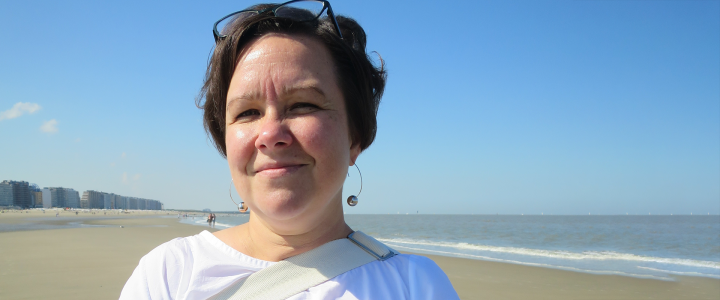

In 2006, Ulla Hakanen travelled to the United States as a Fulbright scholar, studying Russian literature at the prestigious University of California, Berkeley. The experience not only enriched her academic pursuits but also gave skills and insights for a future career path she hadn’t yet anticipated.
Ulla’s Fulbright journey began with a recommendation from an academic advisor, who encouraged her to explore Berkeley for its strong Russian literature program. Despite initial hesitation about the geographic distance, she decided to pursue the opportunity, securing an ASLA-Fulbright Graduate Grant Program from Fulbright Finland Foundation to conduct her doctoral research there.
“UC Berkeley had the best professors and programs, including in Russian literature," Ulla recalls. “It was an excellent program with professors from various backgrounds and countries, including Russia. The academic environment was extremely demanding but equally rewarding.”
Fulbright scholarships often create a ripple effect, and Ulla became part of a chain of Finnish Russia scholars who would advise others after her to pursue the same opportunity. Despite studying Russian literature in an American university raising some eyebrows, Ulla firmly believed that academic excellence transcended borders: “If American universities have the best professors and programs, why shouldn’t that be the same for Russian literature?”
Shift into International Diplomacy
After returning to Finland, Ulla eventually realized that academia wasn’t her calling. “I needed more action and interaction,” she says. With previous work experience at the Finnish Embassy in Moscow, Ulla applied to the Finnish Foreign Service and was accepted. After a decade, she transitioned to the European Union’s diplomatic service, where she has served for the past eight years.
As Deputy Head of the Russia Division within the European External Action Service (EEAS), Ulla also draws on her Fulbright experience daily, she explains.
“After Russia’s illegal and unprovoked full-scale invasion of Ukraine, our work isn’t about engaging with Russia but rather engaging with the world and explaining the global consequences of Russia’s actions,” she explains. The war has required intense collaboration with the EU’s transatlantic partners, and particularly the U.S., Ulla notes, in an effort to counter Russia and coordinate the unwavering support to Ukraine.
From Textual Analysis to Diplomatic Nuance
Ulla reflects that the analytical skills she honed through her literary studies at Berkeley have proven invaluable in her later diplomatic career. “Seminars at Berkeley were excellent practice in analyzing texts and understanding subtle messages,” she says.
“These skills have become crucial in my work, which is about getting very weak signals, subtle messages, understanding connections: hold on, this person is speaking very similarly to someone else. Is there a link between them? So, these skills in literary analysis that I learned in Berkeley, to analyze, listen carefully, read carefully and sense the words, have been very, very useful as a diplomat.”
Building Networks and Fostering Understanding
Ulla continues to cherish and maintain the network she built during her Fulbright year. “The program fosters a unique community where you meet people from around the world,” she says. Her contacts have proved valuable throughout her diplomatic career, providing insights into different cultures and expanding her professional reach. Indeed, she says, it was one of her fellow Fulbrighters at Berkeley who triggered the curiosity that made her apply for one of her first diplomatic posts abroad, at the Finnish Embassy in Israel.
Ulla says her Fulbright affiliation often serves as an instant icebreaker in meetings with American counterparts. “Whenever I mention that I’m a Fulbrighter, it creates an immediate connection,” she notes. The program’s reputation in the U.S. remains unmatched, and the mutual recognition opens doors and deepens conversations.
Learning to See the World the Way Others Do
Despite the rise of the internet and social networks, Ulla believes face-to-face engagement is irreplaceable – and the opportunity to live and work in another country leads to a more profound understanding of societies different than your own.
These skills in literary analysis that I learned in Berkeley, to analyze, listen carefully, read carefully and sense the words, have been very, very useful as a diplomat.
“You reach a completely different level of understanding when you do your shopping in the local supermarket, when you see every day what is on their TV, when you interact with people, not as a tourist, but actually work, be it academic work or otherwise.”
“You can’t achieve the same depth of understanding through books or visiting as a tourist," she argues. "Living in another country allows you to see things from their perspective.”
“There is a kind of development globally towards polarization, and there are also important global changes underway - for example, African and Asian countries are becoming increasingly important players. Europeans and Americans often think that others will learn to see things as we do, but we need to also be much more humble and learn to see things the way others do,” she says, pointing out that Fulbright programs provide amazing opportunities to understand the world beyond stereotypes, strengthening mutual respect and global cooperation.
“In that sense, I think these kinds of exchange programs are very important and indeed with the Fulbright, having the opportunity to really learn America, to learn the U.S., was a huge privilege.”
“Fulbright is really a family," Ulla says fondly. “It’s a community that connects people far beyond borders.”
Ulla Hakanen
Deputy Head of Russia Division, European External Action Service
2006-07 ASLA-Fulbright Graduate Grant
Read the Fulbright Finland News 1/2024!




